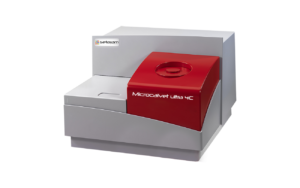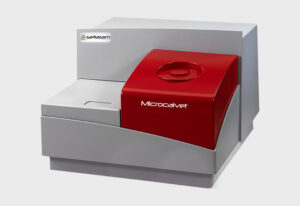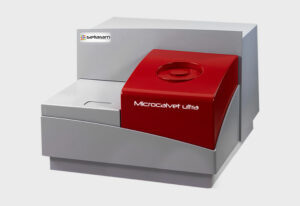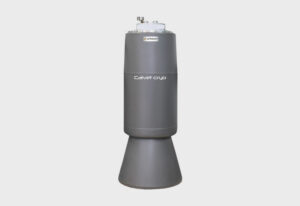Microcalvet Ultra 4C microcalorimeter
Microcalvet Ultra 4C is just as sensitive as its alter ego, Microcalvet Ultra. It measures the temperature, heat and heat flux of even the weakest thermal effects. But its 4-cell sensor means it can characterize two samples simultaneously.

For superior sensitivity, up to higher temperatures, two simultaneous measurements
Microcalvet Ultra 4C measurements are highly sensitive and accurate thanks to the combination of its 3D sensor and electrical calibration. Microcalvet Ultra 4C’s 3D sensor is composed of the most sensitive thermoelectric elements. They surround the four measuring cells, ensuring complete detection of heat around two samples simultaneously. Microcalvet Ultra 4C uses a thermostat with a wider temperature range than Microcalvet. It remains easy to use and can operate between -20°C and 170°C.
Microcalvet Ultra 4C’s standard cells are removable and can be easily cleaned between measurements, enabling characterization of liquids, solids, gels, suspensions and emulsions. Mixing cells with stirring and high-pressure cells are available as options.

Applications
The fields of application for Microcalvet Ultra 4C are vast, but this microcalorimeter really shines when it comes to characterizing polymers, food and biomolecules in solution.
Its sensitivity enables detection of most conformational changes in aqueous solutions of polymers: membranes, micelles, vesicles. Polysaccharide gelation and starch gelatinization hold no secrets for it. Finally, it’s perfect for studying the thermal stability of proteins or enzymes in solution. As its cells are removable, washable and interchangeable, they are ideal if gels, aggregates or other solid particles may be present in the sample or appear during measurement.
Why is it Unique?
-
HIGHEST HEAT MEASUREMENT ACCURACY
3D sensor based on Peltier elements with Joule effect calibration
-
DUAL SAMPLE TESTING
4C means four cells, i.e. dual sample, for greater throughput and a preserved accuracy even with large heat effects
-
MODIFIABLE TEMPERATURE CONDITIONS
for increased flexibility and replication of real life conditions between -20 and 170°C
-
CONVENIENT INTERCHANGEABLE CRUCIBLES AND CELLS
to perform even the most demanding experiments using one instrument:
• high pressure (up to 400 bar), pressure measurement and control
• mixing experiment
Request a quote
e-commerce website – Access spare parts and consumables online
Our online store offers an innovative solution:
- If you are in France, Germany, Switzerland, or in the USA, you can purchase spare parts and consumables in just a few clicks on our online store.
- If you require delivery to another country, please contact us.

Documentation
Application notes
Specifications



